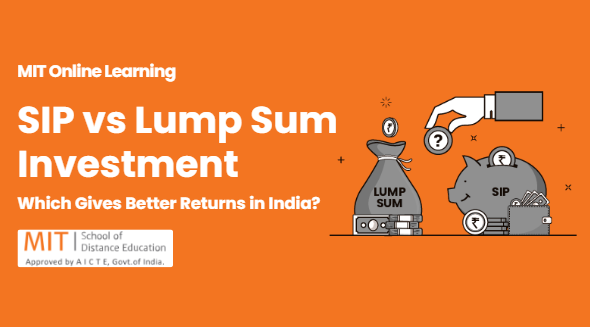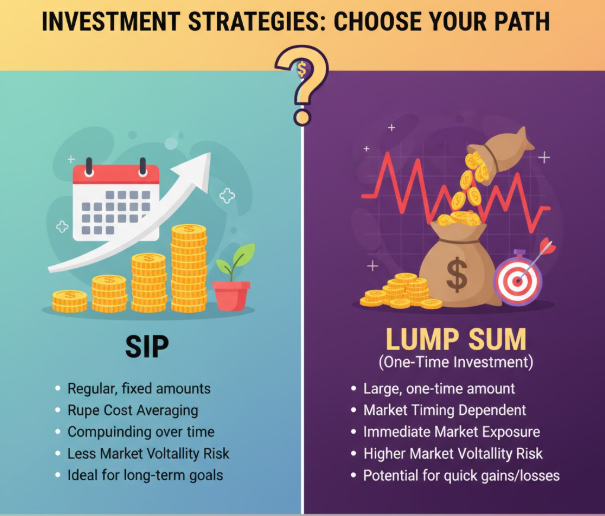
Investing has become a major financial priority among Indian working professionals — especially with rising inflation, increasing lifestyle costs, and future security concerns. Whether you’re planning to build wealth, save tax, or meet long-term goals, mutual funds are one of the most popular investment routes today.
But a common question remains:
👉 Is SIP better or Lump Sum investment better in India?
This detailed guide will help you make the smartest investment choice in 2025 based on risk, returns, taxation, and financial stability.
✅ What is SIP?
SIP stands for Systematic Investment Plan. It allows you to invest a fixed amount every month in a mutual fund.
✨ Key Benefits of SIP
Benefit | Why It Matters |
Rupee Cost Averaging | You buy more units when the market is down |
Highly Affordable | Start with ₹500 monthly |
Lower Risk | Investments spread over time |
Financial Discipline | Encourages regular saving habits |
Best for Working Professionals | Aligns investment with monthly salary |
Ideal For: Young investors, beginners, and salaried individuals.
✅ What is Lump Sum Investment?
Lump Sum means investing a large amount at once — for example: ₹1 lakh or ₹5 lakh together.
🌟 Key Benefits of Lump Sum
Benefit | Why It Matters |
High Wealth Potential | The entire amount grows from Day 1 |
Best in Bull Markets | Higher returns during continuous market growth |
Great for Investors with Surplus Money | Bonus, inheritance, sale profit, etc. |
Ideal For: Experienced investors and HNIs who can handle market volatility.
⚖ SIP vs Lump Sum Investment: Quick Comparison

Factor | SIP | Lump Sum |
Market Timing Risk | Very Low | High |
Risk Level | Low to Moderate | High |
Best Market Condition | Volatile / Falling | Rising (Bull Run) |
Suitable For | Salaried Individuals | Investors with Extra Capital |
Returns Stability | More Stable | Highly Market-Dependent |
✅ SIP is safer
✅ Lump sum may give higher returns — but only if timed right.
📊 Which Gives Better Returns? Real Example
Let’s compare a ₹1,20,000 investment in both methods in an equity mutual fund delivering 12% annual returns.
Scenario 1: Lump Sum
Invest ₹1,20,000 at once
→ Estimated value after 5 years = ₹2,11,000
Scenario 2: SIP
Invest ₹2,000 monthly for 5 years
→ Estimated value after 5 years = ₹1,68,000
✅ Lump sum wins in a bull market.
But what if the market falls?
📉 When markets are volatile, SIP wins because of Rupee Cost Averaging.
You buy more units at a lower price, resulting in better long-term returns.
🧾 Taxation: SIP vs Lump Sum
Both follow the same tax rules for equity mutual funds:
Holding Period | Tax Type | Rate |
Less than 1 year | STCG | 15% |
More than 1 year | LTCG | 10% (after ₹1 lakh gain exemption) |
📝 Tax is applicable only when units are sold — not during investment.
🧠 Which One Should Working Professionals Choose?
Situation | Best Choice | Why |
Stable monthly salary | SIP | Fits monthly budget |
Large cash surplus | Lump Sum | Grow money from Day 1 |
No market knowledge | SIP | Safer + automated |
Long-term goals (5–10 years) | SIP | Wealth compounding |
High-risk appetite | Lump Sum | Higher return potential |
✔ Most professionals prefer SIP due to risk control
✔ A lump sum is great for bonuses or sudden funds
🚀 Hybrid Strategy: Best of Both Worlds
💡 Investment Experts suggest:
➡ Use SIP for regular wealth building
➡ Invest a Lump Sum during deep market corrections
Example:
- Monthly SIP: ₹5,000
- Lump Sum: ₹50,000 during a market dip
Result = Higher corpus + better returns
📌 Expert Recommendation (India 2025)
✅ Markets are volatile
✅ Interest rates are fluctuating
✅ Economic growth remains strong
📍 Therefore:
👉 SIP is the best investment method for long-term wealth creation
👉 Lump sum only when markets are undervalued
🎓 Want to Build a Career in Finance? Study PGDM in Finance at MITSDE!

If you are passionate about finance, investment banking, financial analysis, or wealth management — MITSDE’s PGDM in Finance is the perfect next step!
✅ Why MITSDE?
✔ AICTE-approved industry-recognized diploma
✔ Flexible online learning for working professionals
✔ Expert faculty from top finance backgrounds
✔ Learn Portfolio Management, Financial Markets, Banking & Investment Analysis
✔ Strong career opportunities in BFSI & FinTech
✔ Dedicated placement support
Career Opportunities After PGDM Finance:
- Financial Analyst
- Investment Advisor
- Wealth Manager
- Equity Research Analyst
- Banking & Finance Specialist
🎯 Conclusion
The right investment approach depends on your income, financial goals, and risk tolerance. SIP supports stable growth, while Lump Sum accelerates gains when markets favour you. A wise investor understands both — and applies them smartly.
If you want to build a rewarding career in finance and guide others in wealth creation, PGDM in Finance at MITSDE is your gateway to the industry. Start your journey toward financial expertise — Enroll today!
